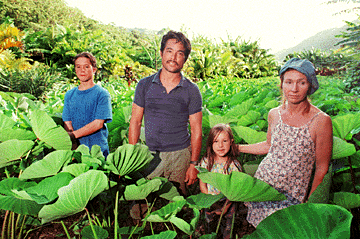
The Strands sell taro leaves harvested from Palolo farmland to a
neighborhood market. From left, Damien, 13, Ted, Kristy-Li, 6, and Anne Strand. Photo by Dennis Oda, Star-Bulletin

The Strands sell taro leaves harvested from Palolo farmland to a
neighborhood market. From left, Damien, 13, Ted, Kristy-Li, 6, and Anne Strand. Photo by Dennis Oda, Star-Bulletin
Harold Narahara's father, Gensaku, first staked a claim in the back of Palolo Valley in 1910, a few years after leaving his native Japan for Hawaii to work in the sugar cane fields.
He started with Manoa lettuce, then switched to turf grass in the 1960s. Nowadays, Harold Narahara concentrates on mondo grass on the three-plus acres he has lived on for all his 62 years.
Before his father's time, the first landowners grew pineapple, he said. Eventually, the land was sold off to the mostly Japanese and Okinawan immigrants who tended the land, about 15 to 18 of them, including Narahara's father.
Today, back where he lives, "the only change is that (many of) the first generation have sold to newcomers, who are putting up nice homes," he said.
Otherwise, his neighbors remain mostly small farmers like him, growing ornamental trees, flowers, vegetables and fruits on the agricultural-zoned land.
"This is heaven," said Anne Strand, a native of Copenhagen, who lives with her husband, Ted, son, Damien, 13, and daughter, Kristy-Li, 6, in surroundings that look more like upcountry Maui than urban Palolo.
The Strands, both 44, lease 16 acres near Narahara, growing Chinese taro for its leaves and bananas.
Before the Strands were married 14 years ago, Ted was into raising goats, about 100 of them, but gave that up because it "wasn't profitable and there were too many problems." He opted for bananas and taro because "they seemed to be the most resistant to bugs and disease" and didn't require the use of chemicals.
The couple sells the taro leaves to a Palolo market and the bananas to a health food store. The money isn't enough for a family of four, but it's a nice supplement to Ted's job in building maintenance at the University of Hawaii-Manoa.
Damien helps with crops, while Kristy-Li is in charge of feeding the peacocks, dogs and cats that round out their "family."
"It's hard work, especially when it rains," Anne Strand said. But in the peaceful, rural setting, she couldn't see living anywhere else.
Neither can Narahara. "I'm not making a lot of money, but I'm making a living. This is way nicer than living in the city," he said.